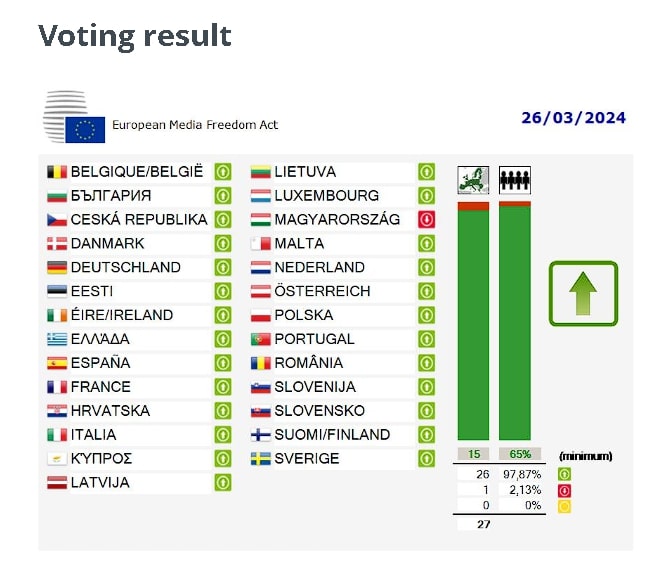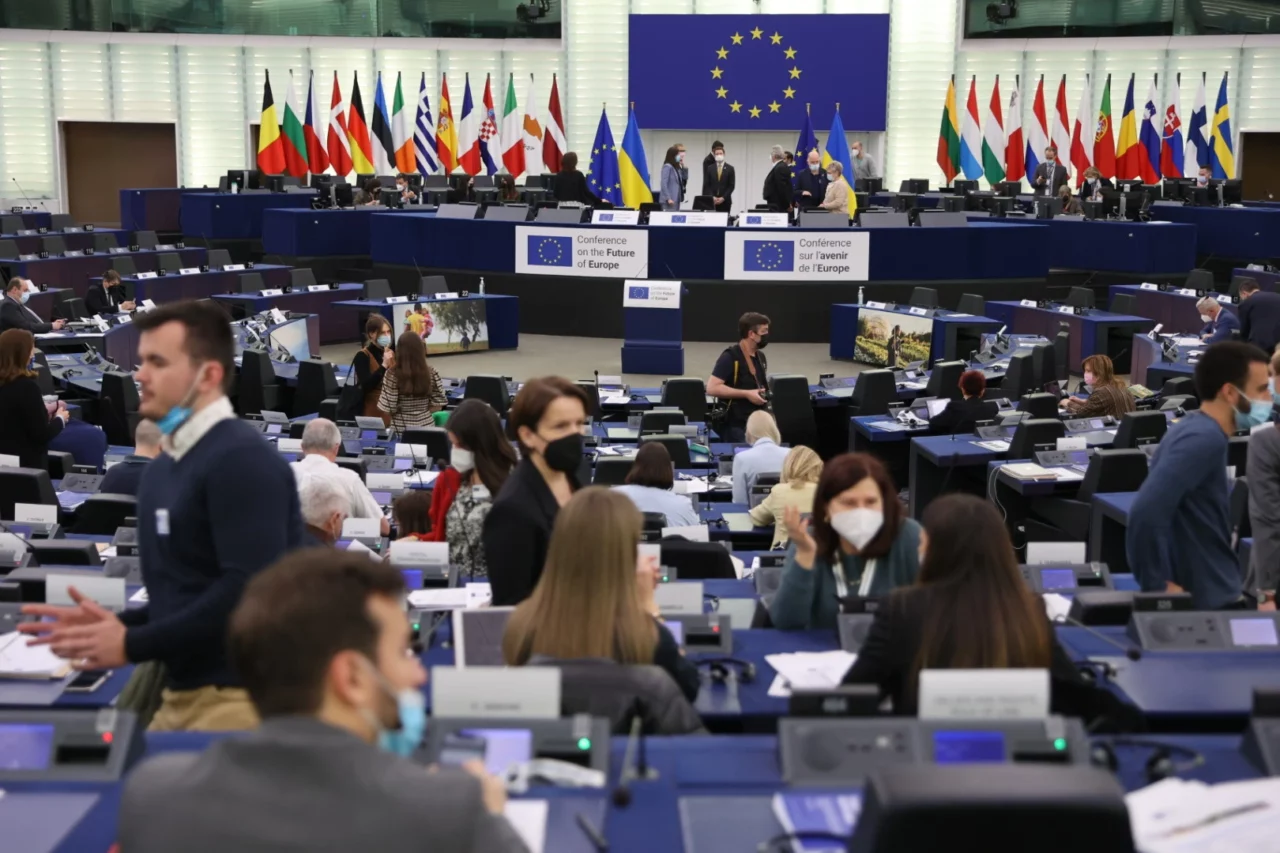Change language:
European Union’s media freedom regulation only vetoed by Hungary

The Council of the European Union recently approved a new EU regulation on media freedom. With 26 out of 27 member states backing the regulation during a Council meeting of agriculture ministers, Hungary stood alone in opposition.
Back in January, the Hungarian government was the only country that rejected the preliminary agreement with the European Parliament, which had already ratified the legislation weeks prior. The Council statement indicated that the final steps, including signing and publication in the EU’s Official Journal, are pending before the law takes effect, with a 20-day grace period thereafter – according to Telex.

During a heated debate in the European Parliament, a member of Hungary’s Fidesz party, Andrea Bocskor, vehemently criticised a proposed media regulation, labelling it as a form of censorship imposed by Brussels.
Bocskor argued that the regulation seeks to exert control over member states’ media without considering their unique characteristics, potentially leading to sanctions and limiting certain content. She claimed that the regulation aims to promote only the “voice of Brussels” while suppressing national and conservative views, portraying it as a tactic to undermine the political right ahead of the forthcoming European elections in June.
In October, Věra Jourová, Vice-President of the European Commission, highlighted Hungary’s media landscape as a driving force behind the initiation of certain legislation. While acknowledging the Commission’s limited direct influence over Hungary’s affairs, she stressed the importance of preventing the monopolisation of information witnessed there from spreading to other regions. The Vice-President stated the following regarding the situation:
The whole tendency in Hungary to monopolise information is something we don’t want elsewhere.
The regulation
The regulation’s core objective is to shield journalists and editors from undue pressure by authorities. It explicitly prohibits compelling them to disclose sources through coercive measures such as detention, sanctions, searches or monitoring software.

Surveillance tools like Pegasus can only be used after authorisation by an independent judicial body based on reasonable suspicion of a punishable offence. Additionally, individuals under surveillance must be duly informed of their rights in such cases.
Moreover, the regulation aims to guarantee transparency regarding media ownership and its potential impact on news content. Ownership details of all media companies and news agencies, irrespective of their scale, must be recorded in a publicly accessible national database. This database should explicitly indicate whether the state holds a direct or indirect stake in the media entity.

Companies are required to transparently report any public funds received, including those from public advertising and financial support. This reporting should include both the total annual amount received and a detailed breakdown of costs per media outlet. Media firms and online platforms are eligible for public funding under fair, proportional and non-discriminatory condition.
Read also:








The Fidesz criminals are of course trying to protect their ability to use mafia methods. Disgusting. Do people in Hungary start to get the realization that something is wrong with their government when it is repeatedly the only one in Europe to vote against the collective will of everyone else?
Our Politicians know best! Save the European Union from itself.
Sort of telling that they are unable to even convince or coerce even one other Member to stand in the Hungarian corner, is it not?
How this can look, example regarding Russia sanctions: https://www.msn.com/en-us/news/world/navigating-eu-sanctions-slovakia-and-hungary-s-diplomatic-moves-in-the-russian-debate/ar-BB1kAAfj?ocid=msedgntp&pc=U531&cvid=3ae0d916844f422c808720fa44b4a553&ei=56
“Reportedly, Slovakia requested Hungary’s support in arguing that Jozef Hambalek, a businessman connected to the Russian motorcycle club “Night Wolves,” should not be included on the EU sanctions list. In return, Hungary asked Slovakia’s assistance in getting a number of other Russian nationals taken off the sanctions list. These individuals included Russian billionaire Vyacheslav Kantor, former Formula 1 driver Nikita Mazepin’s assistant Sergei Mndoiants, and founder of the Russian company “Yandex,” Arkady Volozh.”
It’s no surprise that Fidesz is totally against adding mandatory transparency into media ownership and funding. They have a lot to hide.
Yes, there is freedom of speech in Hungary, but mainstream media is tightly in the hands of Fidesz allies, and competitors have fat change to compete when Fidesz allied media houses repeating the government stories receive massive funding from government. Foreign media companies know that entering into the Hungarian media landscape is like walking into a mine field, so you don’t have much foreign investment nor foreign competition in mainstream media in Hungary.
Really worrying is the safety of journalists when government uses advanced surveillance tech to spy on independent journalistic work, just like they do in Hungary.
https://cpj.org/2022/10/hungarian-journalists-spyware-eu/
Yes, it’s shocking. It’s shocking that ONLY Hungary voted Nay. The kneejerk reaction from the usual suspects is to, predictably, rail against Fidesz, but I will bet my bottom dollar that not a single one of them actually read through the proposition that was being voted on, even the “reader’s digest” version. The E.U. is increasingly adopting the old U.S.S.R. tactics. That’s not a winning strategy. P.S. What is the height of irony? Claiming there is censorship and lack of freedom of the media or expression in Hungary, perpetrated by our government, WHILE writing that on a Hungarian news site. LOL!
Hungary seems to be the only country in the EU, which protects both individual and media freedom of speech.
It is well known that western media is overwhelmingly liberal so they must attack any country which has opposing opinions.
For those of us seeking the truth, Hungary has a better track record than CNN or other leftist media outlets. More people should learn Hungarian in order to see for themselves.
No one here has claimed that there is censorship or lack of freedom in expression. Certainly there is financial pressure and ways to keep alternative voices out from mainstream media but luckily there are ways get alternative voices heard, but not so much in mainstream media due to close relationship with Fidesz and the funding mainstream media gets from the government.
Having more transparency in media funding and protecting journalists from government pressure has nothing to do with U.S.S.R tactics. Hiding facts about taxpayers money spending on propaganda in mainstream media and government using hi-tech spy software to monitor journalists is certainly an authoritarian tactic. I would like to see less authoritarian tactics and more transparency, but Hungarian government votes against that – the only government in Europe who does not want transparency of media funding and protection of journalists.
Steiner Michael & Freedomofspeech – comments made again, highlight the “one direction”, the “narrowness” there inability, to look ” outside the square” or in the real MODERN world, not just the Fantasy World, or the idiotic – idealogy / philosophy world, according to Victor Mihaly Orban.
No “guts” no substance of fact nor truth in both there comments, that AGAIN they should feel EMBARRASSED.